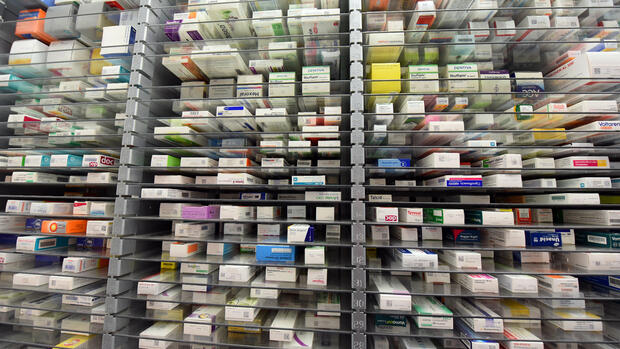Berlin Important antibiotics, fever syrups and even anti-cancer drugs are always difficult to obtain in pharmacies. More than 460 drugs are currently on the list of the Federal Institute for Drugs and Medical Devices (BfArM) for drugs that are not in stock.
The federal government now wants to eliminate the supply bottlenecks with a new law. The cabinet passed a corresponding draft law by the Federal Ministry of Health on Wednesday. “We are making Germany more attractive again as a sales market for generic drugs,” said Minister Karl Lauterbach (SPD) at the federal press conference in Berlin.
Among other things, the European production site should be strengthened and made more independent of Asian countries. “We want to avoid delivery bottlenecks like last winter,” said Lauterbach. The law provides for a number of measures for this.
Specifically, Lauterbach plans to relax the price rules for children’s medicines and to abolish fixed prices and discount agreements in this area. Pharmaceutical companies can increase their sales prices once by up to 50 percent of the last applicable fixed price. Manufacturers of off-patent drugs, so-called generics, have been complaining about earnings in the cent range for years, which has led to companies stopping production.
Lauterbach wants to counteract this development with higher prices. It should also be possible to increase fixed prices or a price moratorium by 50 percent for other medicines that are critical to the supply if there are too few suppliers.
Concerns about delivery bottlenecks remain
In the case of antibiotics, future tenders should also take into account whether the active ingredients were manufactured in the EU and Europe. The aim of the measures is to increase the variety of suppliers and reduce dependence on a few, mostly Asian producers such as China or India.
Specifically, Lauterbach plans to relax the price rules for children’s medicines and to abolish fixed prices and discount agreements in this area.
(Photo: IMAGO/photothek)
Lauterbach promised that certain antibiotics would be increasingly produced in Europe within a few months. There are small factories that could be expanded – or those that are currently not producing at all. “In individual cases you can be very quick here,” said Lauterbach.
In order to increase security of supply, a mandatory three-month storage period for discounted medicines is also to be stipulated. In addition, it should be made easier for pharmacies to dispense drugs with the same active ingredient if a drug is not available.
>> Read here: Pharmaceutical companies criticize Germany as a location
On Wednesday, however, experts and industry associations expressed skepticism as to whether the measures would noticeably improve the supply situation with medicinal products. Nicolas Busch from the consulting firm Boston Consulting Group told the Handelsblatt that the law is a “good first step” to make important medicines permanently available in pharmacies again. “However, the regulations will not be sufficient to strengthen Germany as a pharmaceutical location in the long term and extensively and to initiate an extensive relocation of production capacities.”
No sustainable incentives
According to the general manager of the German Pharmaceutical Industry Association (BPI), Kai Joachimsen, the measures would only apply to around one to two percent of all drugs. “The effect for over 98 percent of all other medicines in the broad basic care is missing,” he told the Handelsblatt. There are no sustainable incentives for a “much needed stronger market participation of pharmaceutical companies”.
The managing director of the Pro Generika industry association, Bork Bretthauer, criticized the fact that the plans initially focus on children’s medicines and antibiotics. “Measures to stabilize the supply of cancer drugs are eliminated, of all things,” he said. “And that’s despite the fact that we only recently experienced that breast cancer patients were worried about tamoxifen.”
The drug was no longer available a year ago and there is no alternative for around 100,000 breast cancer patients. It took months for the situation to improve. A survey by the association showed in February that 30 percent of the generic drug manufacturers surveyed want to remove between ten and 50 percent of their drugs from the portfolio in the next twelve months.
>> Read here: Dangerous hype about diabetes drug from Novo Nordisk captures USA
The health policy spokesman for the Union, Tino Sorge (CDU), also warned of new delivery problems in view of the upcoming allergy season. “Minister Lauterbach must finally stop talking up the situation,” he said. “With 40 percent of the prescriptions affected, chaos is threatening to be announced in the coming weeks.” The traffic light bill will take months before the first relief is felt.
More: Lauterbach has to accept significant cutbacks in cannabis legalization
